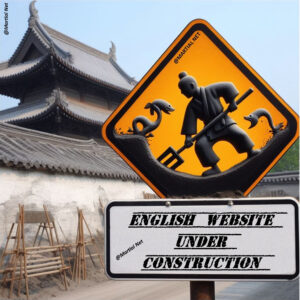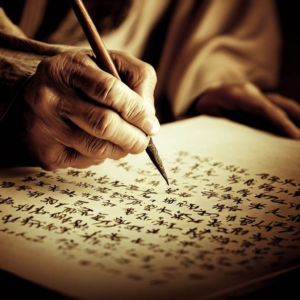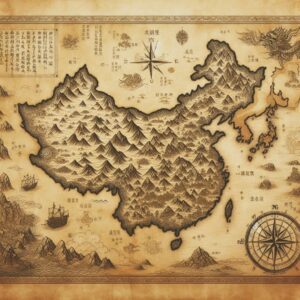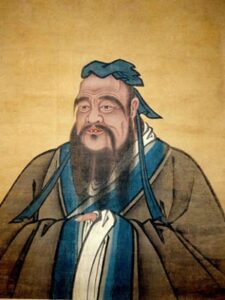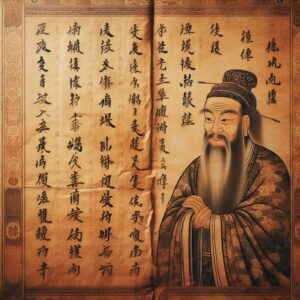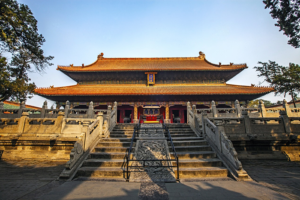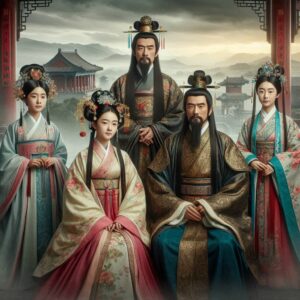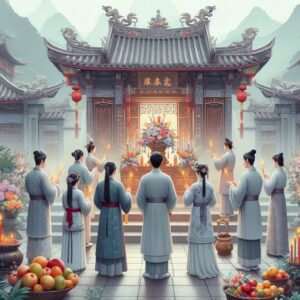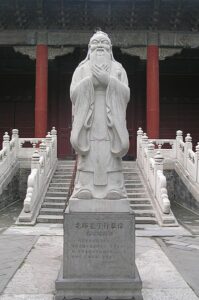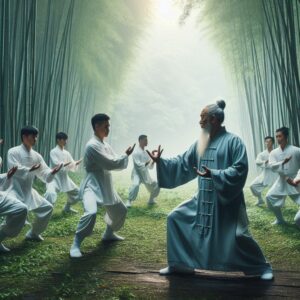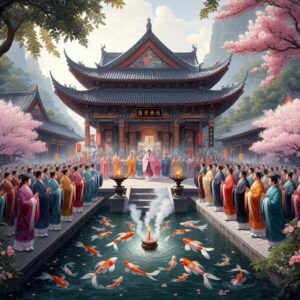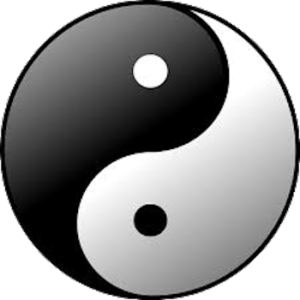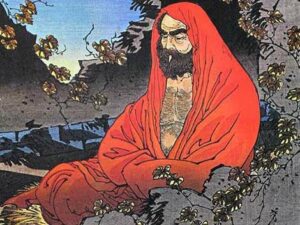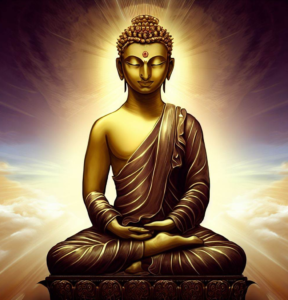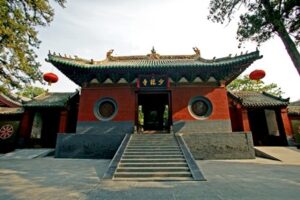Confucianism
Religion and Philosophy
Introduction
Confucianism is one of the major philosophical, religious, moral, and political traditions of China. Developed over two millennia, it exerted a great influence on Japan, Korea, and Vietnam as well. Confucius developed a ritual system and a moral and social doctrine aimed at remedying the spiritual decadence of China, in an era of deep corruption and severe political upheaval. Contrary to popular belief, this practice existed before Confucius, however, according to Chinese tradition, he represents the greatest exponent of Ruism and is therefore worthy of veneration. It was precisely the importance attributed to him in classical Chinese texts that led the first Europeans to think that Confucius was its founding father. By placing a strong emphasis on family ties and social harmony among larger groups, and therefore on the righteousness of the real world, rather than on a soteriology that projects human hopes into a transcendent future, Confucianism is defined as a humanistic doctrine.
History of Confucianism
The history of Confucianism begins with the life of Confucius (551-479 BCE), a Chinese philosopher and teacher who had a tremendous influence on Chinese culture and many other Asian cultures. After his death, his teachings were passed down by his disciples and continued to spread throughout China and other parts of Asia. During the Han dynasty (206 BCE – 220 CE), Confucianism became the official philosophy of the Chinese state and its teachings were incorporated into the official education. Over the centuries, Confucianism continued to evolve and develop, with the emergence of different schools of thought within Confucian philosophy. Today, Confucianism remains one of the major philosophical, religious, moral, and political traditions of China and the Asian world. Its teachings continue to be studied and practiced by millions of people worldwide.
Life and Works of Confucius
Confucius (551-479 BCE) was a Chinese philosopher and teacher born into an aristocratic family in the province of Shandong. After losing his father at a young age, he worked as a herdsman to support his family. Thanks to his intelligence and passion for learning, he became a respected teacher and philosopher.
Beyond teaching, Confucius worked as a government official in various Chinese states. During his service, he attempted to promote his ideals of justice, order, and good governance. However, due to the political turmoil of the time, he faced many difficulties in realizing his plans. Confucius traveled throughout much of China, visiting various feudal states and trying to convince rulers to adopt his principles.
His main works include the “Analects”, the “Great Learning”, and the “Doctrine of the Mean”. The “Analects” is a collection of sayings and conversations attributed to Confucius and his disciples. This text is considered one of the classics of Chinese literature and has been very influential in Confucian philosophy. The “Great Learning” focuses on the pursuit of wisdom and knowledge through education, while the “Doctrine of the Mean” discusses the middle way, or the search for balance between opposites.
Confucius believed that education was the key to improving society and that every individual should strive to become a better person. He advocated the importance of family ties, filial piety, and social harmony. His philosophy focused on morality, virtue, and respect for hierarchical relationships within the family and society.
Confucian Philosophy
Confucian philosophy centers on the pursuit of wisdom and knowledge through education and learning. One of the key concepts of Confucian philosophy is the role of education in shaping the individual and building a better society. Confucius believed that education was the key to improving society and that every individual should strive to become a better person.
Other key concepts of Confucian philosophy include morality, virtue, and good governance. Morality is considered one of the foundational pillars of Confucian philosophy and is seen as a tool for improving society and building harmonious relationships between people. Virtue is another important concept in Confucian philosophy and refers to the practice of ethical and moral behavior. Finally, good governance is another key concept of Confucian philosophy and refers to the effective and just management of society.
Influence of Confucianism on Chinese Culture
Confucianism has had a profound influence on Chinese culture and many other Asian cultures. Its philosophy has impacted many aspects of Chinese culture, such as religion, art, literature, and politics. In Chinese religion, Confucianism has influenced the practice of rituals and ceremonies. Many Confucian temples have been built in China to honor Confucius and his teachings. Additionally, Confucianism has also influenced Chinese art, with many works of art depicting scenes from Confucius’ life or expressing themes from his philosophy.
Chinese literature has also been influenced by Confucianism, with many classical texts reflecting the themes of Confucian philosophy. Moreover, many Chinese writers have drawn inspiration from Confucian philosophy for their literary works. Finally, Confucianism has had a great impact on Chinese politics. Its philosophy of good governance has influenced the management of Chinese society for centuries, and many Chinese emperors have sought to govern according to Confucian principles.
Confucian Society
Confucian society is characterized by a hierarchical social structure and the central role of the family. In Confucian society, the family is considered the fundamental unit of society and the role of parents is very important. Parents are seen as the guardians of morality and virtue and have the duty to educate their children to become better people.
Women in Confucian society had a subordinate role compared to men. Women were considered inferior to men and had to obey their fathers, husbands, and elder brothers. However, women also had an important role in managing the household and educating children.
Relations between different social classes in Confucian society were governed by a set of norms and rituals. The upper classes were expected to show respect for the lower classes, while the lower classes were expected to show deference to the upper classes.
Confucian Religion
The role of religion in Confucian philosophy is complex. On the one hand, Confucianism is not a religion in the traditional sense of the term, as it does not involve the worship of deities or the pursuit of salvation in an afterlife. On the other hand, however, Confucianism includes a number of religious practices and rituals that are considered important for building a harmonious society.
Confucianism relates to other religions and spiritual practices in various ways. In some cases, Confucianism has incorporated elements of other religions, such as Taoism and Buddhism. In other cases, however, Confucianism has maintained a distinct position from other religions.
Religious practices associated with Confucianism include ancestor veneration and the celebration of ceremonies in honor of Confucius. These practices are considered important for maintaining social harmony and for honoring the memory of one’s ancestors.
Fundamental Principles of Confucianism
Confucianism is a philosophy that focuses on the pursuit of wisdom and knowledge through education and learning. Confucius believed that education was the key to improving society and that every individual should strive to become a better person. His moral and social doctrine aimed to remedy the spiritual decline of China in an era of profound corruption and severe political upheaval.
One of the fundamental principles of Confucian philosophy is Ren (仁), or benevolence, which refers to the humane quality of a person. It is the virtue of humaneness, goodness, and kindness. Ren is considered one of the foundational principles of Confucian philosophy and has been very influential in Chinese culture. It is applied in everyday life through the practice of ethical and moral behaviors, such as kindness, compassion, and empathy.
Another fundamental principle of Confucian philosophy is Li (ritual), which refers to the importance of rites and ceremonies. In reality, this term can also be understood as the importance of relationships between parents and children, between siblings, between relatives, etc. Li is considered another fundamental principle of Confucian philosophy and has been very influential in Chinese culture. It is applied in everyday life through the practice of rituals and ceremonies that strengthen family and social bonds.
Yi (righteousness) is another fundamental principle of Confucian philosophy that focuses on the pursuit of justice and equity. It is applied in everyday life through the practice of just and equitable behaviors, such as respect for laws and social norms.
Finally, Xin (honesty) is another fundamental principle of Confucian philosophy that focuses on the pursuit of honesty and integrity. It is applied in everyday life through the practice of honest and transparent behaviors, such as sincerity and loyalty.
Confucian Philosophy and Martial Arts
Confucianism has had a profound influence on Chinese and other Asian martial arts. Confucius himself taught archery and horsemanship, activities that require discipline and respect, fundamental tenets of Confucianism. Today, many aspects of Confucianism are present in modern martial arts: the greeting at the beginning and end of a class, the relationship between masters and students, the respect for ranks, courtesy, and veneration for ancient masters. These rituals are crucial for maintaining the ethics and integrity of martial arts, preventing them from becoming violent activities or simple sports.
In Korea, Taekwondo is deeply influenced by Confucian principles. Respect for the master and the importance of discipline are central to the practice of Taekwondo, reflecting the Confucian values of respect and obedience. Moreover, the concept of “Do” (the way) in Japanese Karate is akin to the pursuit of wisdom and personal perfection advocated by Confucianism. Gichin Funakoshi, considered the father of modern Karate, emphasized that the ultimate goal of Karate does not lie in victory or defeat, but in the perfection of the character of its practitioners.
These principles not only enrich the practice of martial arts but also promote personal and moral growth, aligning with the Confucian ethics of continuous improvement and social harmony.
Influence of Confucianism on Other Asian Cultures
Confucianism’s influence extends far beyond China, reaching other Asian cultures such as Japan and Korea. In Japan, introduced in the 6th century AD, it became one of the main philosophical currents during the Edo period (1603-1868). In Korea, from the 4th century AD, Confucianism was established as the official philosophy during the Joseon dynasty (1392-1910).
In both countries, Confucianism influenced many aspects of culture, such as religion, art, literature, and politics. Religious practices and rituals associated with Confucianism were also adopted in Japan and Korea, with the construction of Confucian temples and the celebration of ceremonies in honor of Confucius.
